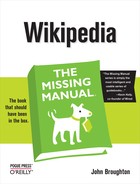Wikipedia’s core is its articles’ content. With so many editors collaborating on Wikipedia, disagreements over content are inevitable. Most of the time, editors resolve these matters on their own, after a reasonable discussion. If you find yourself involved in a content dispute, follow the guidelines in this chapter to engage the other editor in a helpful discussion. If push comes to shove, this chapter also shows you how to use Wikipedia’s formal processes for important disagreements that can’t be resolved informally.
If it’s true that there’s strength in diversity, then Wikipedia has the strongest volunteer corps possible. More than a billion people worldwide have Internet access, and a very large percentage of those speak English as a primary or additional language. They’re all potential editors of the English Wikipedia. The diversity of editors is one reason why editors disagree about article content. Another is a lack of knowledge of Wikipedia’s rules, which aren’t all intuitively obvious.
Only about half the editors of the English Wikipedia live in the United States (population 300 million). The rest come from an incredibly wide range of countries, cultures, and continents. English is the primary language of most inhabitants of the United Kingdom (60 million people), Canada (33 million), Australia (21 million), Ireland (6 million), New Zealand (4 million), and numerous Caribbean islands like Jamaica (population 3 million). English is also spoken as an additional language by hundreds of millions of adults in Europe, India, the Philippines, and other countries. United primarily by a common language, differences of opinion are inevitable when people work collaboratively on an encyclopedia that intends to offer definitive information to the world.
Wikipedia has no age requirement for editors; there are certainly many pre-teenagers and teenagers who contribute constructively, as well as a number of adults who do not. Nor are there requirements for expertise (in anything, let alone in what’s being edited), a point on which Wikipedia has been criticized by many people. (People often overlook the fact that the lack of such barriers made Wikipedia what it is today.)
Finally, people’s beliefs differ. This goes beyond whether Elvis is alive or not; Wikipedia’s articles cover politics, religion, sexuality, culture, geography, and numerous other areas where people know they are right and others are wrong. Wikipedia’s rules emphasize that facts and sources matter, and that personal beliefs and opinions don’t, but that’s not the norm on the Internet, at places like discussion boards and blogs. Wikipedia’s rules are thus often a major shock to newcomers.
Other editors may not only come from a different background, but may also have different reasons for editing at Wikipedia. Those reasons can make a big difference in how determined they are to defend their edits.
A number of studies have looked at why people edit at Wikipedia. From the perspective of content disagreements, the level of emotional engagement an editor has with an article he’s editing is important. Not surprisingly, emotional engagement runs the gamut: negative concern (a vandal), just passing by (a casual reader), relatively disinterested (not the same as uninterested), personally involved (a conflict of interest problem), expert (a plus, but not an unmitigated one), passionate (a plus if the passion can be kept in check), fanatic (a big problem), and kook (someone usually shut down pretty quickly).
As discussed in Part 1, Wikipedia has three core content policies: neutral point of view, no original research, and verifiability. These three policies are at the heart of a majority of content mistakes, so checking for their violation should be the first step in examining an article’s edits (Reviewing Content Changes: A General Plan of Action). Editors also frequently violate two other policies, simply because they’re not familiar with them:
Wikipedia:Ownership of articles (shortcut: WP:OWN) states that no editor owns the content of an article. It doesn’t matter if she created it, or if she has been the main contributor to it for the past year, or if she is the acknowledged world’s best expert in the subject; she doesn’t have the right to revert other editors’ edits simply because she doesn’t like them.
The only way that an editor can properly prevent her words from being changed is not to put them in a Wikipedia article in the first place. And no editor has any special power or authority over any other editor when articles are edited.
What Wikipedia is not (shortcut: WP:NOT) makes it clear that certain types of information aren’t in accordance with Wikipedia’s purposes. Content that doesn’t belong in Wikipedia includes: usage guides or slang and idiom guides; presentation of original thought; routine news coverage, including first-hand news reports on breaking stories; advocacy, recruitment, opinion pieces, self-promotion, or advertising; directories of external links; collections of public domain or other source materials; tributes to departed friends and relatives; instruction manuals, and how-to instructions; FAQs; plot summaries and song lyrics; and other matters lacking encyclopedic substance, such as announcements, sports, and gossip.
In short, if the text in question is not the sort that you’d find in the Encyclopædia Britannica, then there’s a pretty good chance that Wikipedia doesn’t want that text either. Wikipedia is, like EB, an encyclopedia.
